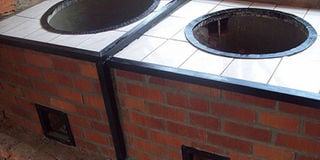Prime
Schools grappling with high operational costs

Energy-saving stoves are a cheap alternative to many other methods in use today.
One of the biggest expenses that schools incur mostly during their operations is on energy for lighting and cooking. Most institutions, especially in rural areas, rely on biomass to meet their energy needs, a small percentage complement it with fuel for lighting and running machinery while urban based institutions mainly rely on electricity.
With the increasing costs, schools can adopt more energy efficient methods through application of cheaper energy solutions to meet the demand for energy without charging extra fees from the parents.
Experts say over 90 per cent of the population in Uganda uses inefficient traditional cooking technologies fueled by firewood and charcoal leading to depletion of the environment.
Maximising cheaper alternative resources and sustainable energy technologies is one way of saving the scarce resources, saving energy and money that can then be used for other necessities and the saved energy is then available for other users.
Savings
Fr Kennedy Oziga, the head teacher of Oluko Secondary School in Ayivu Sub County, Arua District says the school saves Shs525,000 per term since introduction of institutional rocket stove in 2010.
“We used to spend up to Shs900,000 every term for firewood but with the construction of the rocket stoves, very little firewood is required, our kitchen is smoke free and cooking was made easy,” said Fr. Oziga adding that the school also acquired a solar system.
He explains that the existence of the partnership with GIZ, a Germany Development Organisation has improved access to clean energy through provision of efficient cooking stoves and solar powered system for lighting and to charge mobile telephones for teachers and the community as well as torches for security personnel.
Fr. Oziga says it would cut down up to 70 per cent of the cost of firewood and replace kerosene or petrol-run generators.
Experts say that besides being a source of saving in terms of resources, renewable energy is described as safe and free that make the users live risk free.
Rosette Komuhangi, the Project Coordinator in charge of Communications at GIZ-Energy Programme says energy saving cooking stoves production for other domestic and institutional use reduce fire wood consumption up to 60 and 70 per cent.
“This means huge savings for schools that can be reinvested in education, improved infrastructure and teachers’ training. We work with solar home systems and solar lanterns’ retailers and distributors; with solar phone charging businesses in areas of Uganda that are far from the electricity grid. We also work with biogas systems producers and installers and with briquettes makers,” says Komuhangi.
She explains that GIZ in partnership with European Union is working to increase access to modern energy and reduce poverty through energy access and energy efficiency mainly in in rural areas to achieve lasting access to clean and efficient energy.
“This means huge savings for schools that can be reinvested in education, improved infrastructure and teachers’ training,” she adds.
During a recent tour in the West Nile, Energy Minister, Eng Irene Muloni described the energy saving initiative as an income generation to school.




